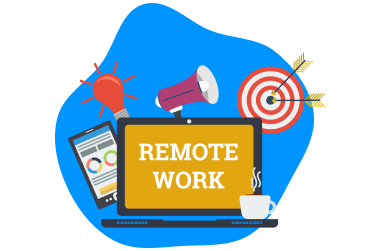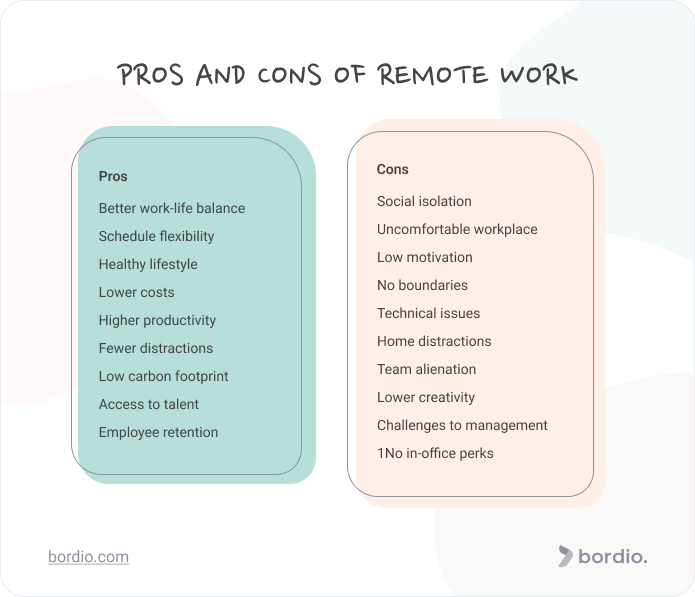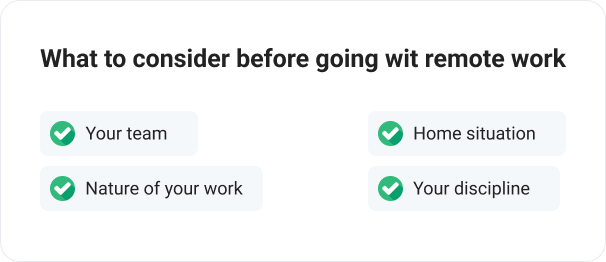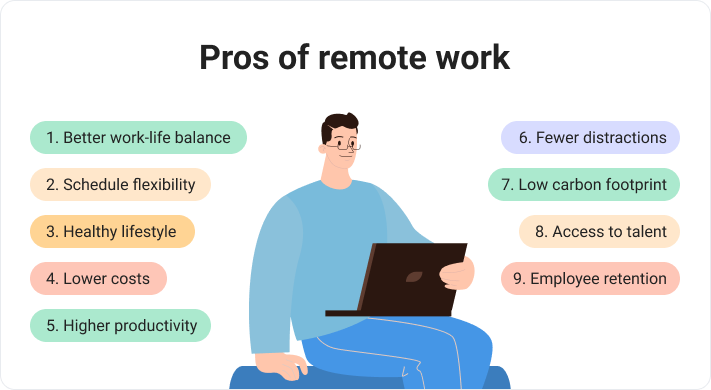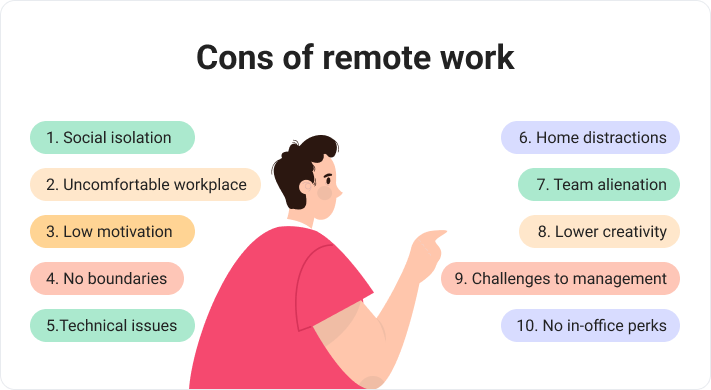Remote work versus office work is a long-known struggle with passionate evangelists on both ends. Some people praise the office and hate working from home, others share polar feelings.
When the pandemic first broke out and we were quite literally forced to stay at and work from home, the debate took a pause because the entire world was trying to reorganize its processes and not go crazy.
Now, as we see the pandemic descending, and many companies pushing for a return to “the old ways”, the issue becomes more pressing again. In this article, we will not be encouraging you to go one way or the other but will instead present you with the benefits and downsides of remote work and let you decide for yourself whether you want to go down that route or not.
The ambiguity of remote work
Remote work is a concept that’s been debated for decades. Anyone considering remote or in-office work has to evaluate their own case and circumstances first and be skeptical about someone else’s experience.
What to consider for potential remote workers:
#1 Your team
Does everyone work in the office space and will you be the only one connecting on Zoom? Would there be potential roadblocks to work if you switch to a remote format? It will be convenient to use remote team management tools. For example, if this one colleague only gets the work done when you personally come by their desk to chase your request or team could use task tracker app that will show everyone the goals, tasks and progress of the project.
#2 The nature of your work
Software developers have little trouble switching to working remote, but it can be much more difficult if you work in banking or, let’s say, as a barista. It will be much easier if you start using remote team collaboration software.
#3 What your home situation looks like
Is there a desk for you to work on? Do you have kids or pets who will distract you every minute? Do you live in a loud neighborhood? Does your home have an A/C for the hot season? Your surroundings have a great influence on productivity, so don’t underestimate them in your decision-making.
#4 Personal discipline
Some people have much more difficulty focusing on work when they are not supervised and when nobody sees them. While everyone can work on themselves and get better, it is important to honestly acknowledge your drawbacks and not put yourself in a tricky situation.
The bottom line is that it’s not black and white. Yes, remote work can be beautiful and a great solution for some, but one should be prepared for remote working and be aware of potential difficulties they might face.
Pros of remote work
If you ask remote employees and their management about good reasons to go for the remote work format, they are likely to give you one of the answers below.
Better work-life balance
Employees win back the time otherwise wasted on commuting and spend 15 minutes preparing for work instead of 1 hour (if we skip makeup, clothes selection, etc – not having to make ourselves look presentable). Plus, we get extra sleep which adds to our well-being, and lunchtime can be used for family bonding, walks, or workouts. And if needed, this spared time can be used to cross out a couple of things from our digital to-do lists. Using online free time planner you will be able to balanse it easyly.
Increased flexibility in schedule
Remote work allows us not to worry about commute time or travel. We have more freedom with our online calendar planners and can schedule meetings earlier or later than usual to have more focused work time. If we want to do a quick 30-minute workout, we can do it at home but not in the office space. Picking up and dropping off kids at school is also much easier if you stay in the neighborhood. And of course you will have free time in your online time planner if you will perform daily tasks from your work free planner online. We recommend Bordio and his tools for project managers if you are in a higher management position in the team and everyday time manager systems.
Healthier lifestyle
One of the great cons of working remotely is having more hours to sleep and cook healthy meals. Remote work adapters can skip junk food business lunches in the cafe by the office and incorporate short-time workouts at home or walks around the block. Keeping a balance of work and downtime life on a remote job will be easier with electronic planners.
Reduced costs for everyone
Both companies and individual remote workers get to enjoy cost reductions when they switch from mandatory physical presence in the office.
Employees avoid commuting costs and having to spend extra on business clothing and lunches, management can save money on smaller office spaces and lower utility bills.
Higher productivity
One of the critical cons of working remotely is having better chances of doing the deep focus work without distractions, e.g. someone coming to your desk to quickly check something or chit chat.
At the same time, it might also be the opposite with too many distractions at home, such as the fridge, kids, cats and dogs, Netflix, etc. This can be solved by proper working time organization.
Fewer distractions
Some will argue with that but working remotely is helping many employees get into the state of flow and do the tasks they are unable to complete due to typical office distractions.
Of course, working remotely is only productive if the person can fight the urge to go lay down for a bit, but generally, it is great if you need to preserve quiet time for some important focused tasks.
Tip: check out Bordio’s list of best productivity books to upgrade your work routine and become more professional and efficient.
Smaller carbon footprint
When we work remotely, we don’t commute to the office or customer meetings, meaning that we don’t use up gas for our cars, or take space in the public transportation, leading to lower carbon emissions associated with our activities.
However, the most drastic eco-friendly effect is when we skip flying to meet with partners or colleagues from other locations. Additionally, remote workers tend to eat at home and not waste single-use plastic for coffee cups and packaged fast-food meals.
At the same time, if we order food deliveries at our homes, then someone has to deliver them using petrol, plus such food is usually packed with plastic. So we shouldn’t assume that working from home is eco-friendly by default.
Access to talent anywhere in the world
If you’ve ever had to hire someone, you know how difficult it may be to find the right person who would meet the requirements and would be a fit for the team. When you are not limited to a specific location, the hiring process becomes a much more interesting game.
Ability to retain your best employees
Many professionals were advocating for remote work long before the pandemic hit but they weren’t really listened to. Now that we’ve all gone through a drastic shift in working culture, millions of people worldwide have experienced the benefits and flexibility of working remotely, and they are not ready to go back to the old ways.
We’ve already seen the Great Resignation spike where top talented and experienced employees were resigning from companies that insisted on a return to 9-to-5 for no apparent reasons other than the “we miss you” statements.
It’s still too early to say but it looks like it’s the top employees who feel most comfortable leaving their employers because they can find an alternative position relatively easily. And it looks like offering a remote (or at least hybrid) work format will be a must to retain your most efficient workforce.
Cons of remote work
If you decide to work remotely or move your team to a fully functioning hybrid model, you should know that it’s not all roses. All these significant benefits of working remotely that we’ve just discussed can easily be outweighed by the negative side effects.
The good news is, that if you know what the potential cons of remote work are, you can manage and mitigate them.
Social isolation
Social isolation is a bigger problem than we tend to think. It can lead to mental health struggles that will affect remote workers for months and years to come. So, anyone working remotely needs to make a conscious effort to socialize outside of their work, engage actively in online meetings, and find the time to meet their colleagues in person occasionally.
Tip: If you know someone who is stuck with working from home and struggles with leaving the house, suggest they add going out as a task in their daily planner. That way, even if they’re unsure about it, they’ll feel slightly pressured to go out to be able to cross out “the to-do”. It’s not a trick that one should use all the time, but it can be life-changing for someone stuck in a rut.
Struggle with the workplace
Having to find a quiet and comfortable place to work at home is a struggle if you don’t leave alone or if have a tiny place that is not designed for working. With no desk to accommodate the laptop and other equipment, a remote worker is likely to resort to their bed or sofa which is not as productive and creates a risk of random naps.
Lower motivation
This downside of remote work is arguable and won’t apply to everyone. But nonetheless, some people have a lower motivation to go through their job tasks when they are at home and feel detached from the rest of the company.
Tip: if your colleagues have no motivation to work or feel overwhelmed with the workload, offer them out task prioritization guide that will make the tasks in their weekly planner more bearable and manageable.
No clear boundaries
When you live and work at home, the line between professional and personal lives becomes blurry. Remote jobs are notorious for leading to more working hours and eventual burnout.
When you work at home and have no plans, it’s easy to just think “okay, I’ll work longer hours because I have nothing better to do in any case”. Anyone who manages remote teams must warn their employees against such behavioral patterns. It can seem good for the company when employees work more but in reality, they end up being less productive, making mistakes and losing motivation.
Tip: time management can help establish and maintain clearer boundaries. If you don’t know where to start, read our list of 7 critical time management skills and pick one of the best time management books with great advice.
Technical issues
It can be nice to use this excuse to occasionally ditch a boring meeting and blame it on technology. But not let’s not play it down – technical issues meddling in the work process are a real issue to the business.
Every remote worker must have powerful internet bandwidth and modern PC, and anything else that’s required to work efficiently and with no downtimes or delays. Depending on the employment agreement, management might compensate for the equipment or deliver it to the remote workers’ house.
Home distractions
Kids, spouses, and pets who do not understand the concept of boundaries and working hours can cause constant distraction and result in errors, longer task resolution, and all sorts of issues with productivity and acing at your job.
Alienation from the team
When a face-to-face connection is unavailable, it becomes more difficult to bond with the rest of the team. Video conferencing can compensate for some of that but not replace physical presence completely.
Already now some specialists report that remote employees are treated as second-tier team members and are less likely to be promoted or praised compared to their colleagues who remain in the office space. This issue needs to be addressed by HR and senior management to help those who mistake physical proximity for professional achievements.
Risk to creativity
Creative tasks and brainstorming sessions can be less efficient if some team members attend scheduled meetings online while others sit in the same room. Again, this will not be an issue for everyone but it is a valid risk that needs to be acknowledged and dealt with.
For example, with technology that connects those who work remotely via the conference call and enables everyone to participate in meetings actively. And to make those meetings less awkward, incorporate a couple of ice breaker games for conference calls.
Management challenges
During the time of shifting from traditional to remote and hybrid environments, managers can experience additional difficulties due to them and their employees having issues with technology.
Still, as the management positions are typically occupied by professionals of greater age, they are more vulnerable to adapting and mastering new technology. So for a period of time, management will have to do their normal duties, plus keep themselves and others organized as the work process changes.
Missing out on office perks
Office perks depend on your employment but many companies offer cool bonuses like free food, gym, etc if you come to the office. You don’t really get those bonuses at home unless there is a compensation program for remote employees (i.e. you get lunches delivered, or the company pays for any workout classes or gyms near you).
Members of the compensation committee might need to consider these factors when designing benefits that cater to remote and hybrid workers.
Final thoughts on pros and cons of remote work
Both remote and office-based work have their own pros and cons. Whether it’s a blessing or a curse would depend on your particular situation. Some approaches to work, like Agile and Lean would be more relaxed and inclusive to new things like remote work, whereas alternative frameworks like Waterfall or PRINCE2 may require more time and effort to make it work for their process.
Either way, it is best to stay open to changes in your work circumstances and make the most of whatever format you find yourself in.
If you are in a management position, make sure you establish clear ground rules when building remote or hybrid environments. It will help both sides feel more comfortable during the shift and maximize productivity and cooperation. Don’t forget to try the best virtual planner from Bordio.
For more useful resources, check out our guide on accountability in hybrid work and get inspired with 29 teamwork quotes about working together.
